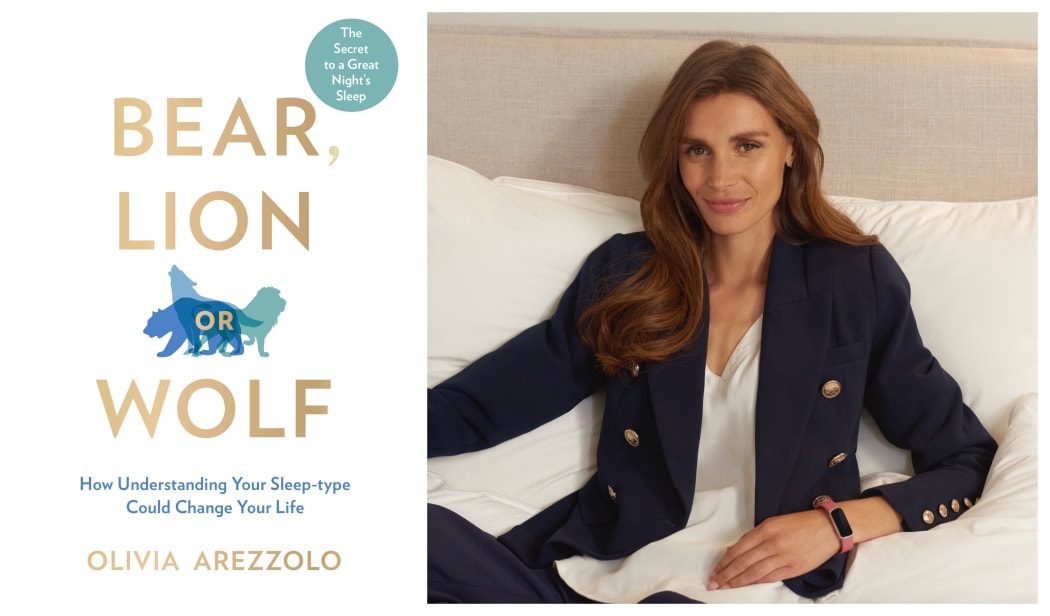What is your sleep type? Bear, Lion or Wolf?. Olivia Arezzolo is one of Australia's go-to sleep experts and her book, Bear Lion or Wolf aims to help people understand their sleep type. She says this has the potential to change lives.

Olivia Arezzolo Photo: supplied by Echo Publishing Au
She tells Nine to Noon sleep types are 50 percent dependent on our genetics. There are specific genes PER3, PER2 and PER1, which determine whether you're more likely to go to sleep early and wake up early, or whether you’ll go to sleep late and wake up later.
The circadian rhythm plays a central role as an autonomic function in our bodies, but individual genetic traits play a role.
“An individual’s sensitivity to light can differ by more than 50 times," she says. "So, for example, if you are extremely sensitive to light, in the evening when you’re mentally winding down if you’re exposed to artificial light, be it through a device or a ceiling light then you’ve be extremely stimulated.
“However, if you are not sensitive to, or if you’re in the lower spectrum then you are be exposed to the same amount of light but be able to fall asleep with ease and not have your sleep disruption.”
She has designated names for chromotypes in her book - Lions, who wake up early and get into it; bears, who wake up reasonably early, have a coffee and get into it, and the wolves, those who stay up at night, when they are at their peak, and then sleep in late.
She says modern living has brought more sleeping problems, which she says, are synonymous with the wolf types, who now make up half of the population. Before, it was thought bears made up half the population.
“There has definitely been a growth, so much so that it is now 50 percent wolves and then 25 percent bears, and 25 percent lions," she says.
Another animal she features in the book is the dolphin, those who don’t really have a typical sleep pattern and don’t fit into those categories, based on her research sources.
“If anything, they are the most closely correlated with wolves, because wolves also have quite a few sleeping issues," she says.
Arrezola says biological factors that determine sleep patterns include age, sex, health conditions such as anxiety and depression and behavioural factors such as exposure to blue light, devices, stress and how late you’ve eaten in the evening, what time you’ve risen in the morning, what time you’ve had your caffeine and your diet.
Her top recommendation is to try to work with your natural rhythm with sleeping, and has a tried and tested method of sleep hygiene to enable good sleep.
“I have a signature bedtime routine, that is ideally modified for each chronotype, particularly in terms of time… The steps for that is to block out blue light, to consume lavender, to have a good-night phone alarm and disconnect from tech time. To have a shower, to use magnesium, to meditate or read and use an eye mask.”
The variations to that routine for each chronotype, with specific timings that align with each, which she says, can make all the difference.
Winding down after work and stimulation with these routine can take 10 minutes, and even so can be hard for some.
“Of all of those steps sometimes there is resistance and challenges to meditate or read. I’d say, even if it’s just opening a book and reading one page, it’s still part of the process," she says.
She says it takes time to integrate a routine in our daily lives.
Sometimes, it’s not a lack of sleep hygiene keeping us awake but an underlying cause - stress and illness can be the main reason. Even so, methods of sleep hygiene will signal to the brain in a way that makes it relax.
“One of the most important things to know is, although this sounds like simple sleep hygiene, each of those steps calms the brain on a biological level. Each of those steps releases melatonin, which is a calming hormone. It makes us sleepy and if you think about the effects of caffeine – it is a physiological substance, but it still makes us psychologically more alert and awake. So, if you think about this routine, it’s like the opposite.
“Magnesium is a physical substance, it’s still going to make you relax and I think that can be really helpful to know... The brain doesn’t distinguish what calms it down, whether it’s physiological or psychological. So, you can use these steps to create a greater calmness in your brain, which is going to help you switch off easier.”
Shifting sleep and wake times can be achieved by exercising and eating at strategic times, but utilising light is the most simple and powerful technique," she says.
“The greatest factor to control your circadian rhythm is light. The earlier you block it out in the evening, the more tired you become and the easier it is to fall asleep earlier. Also, the earlier you expose yourself to bright light in the morning the earlier you’ll feel alert and awake.”

